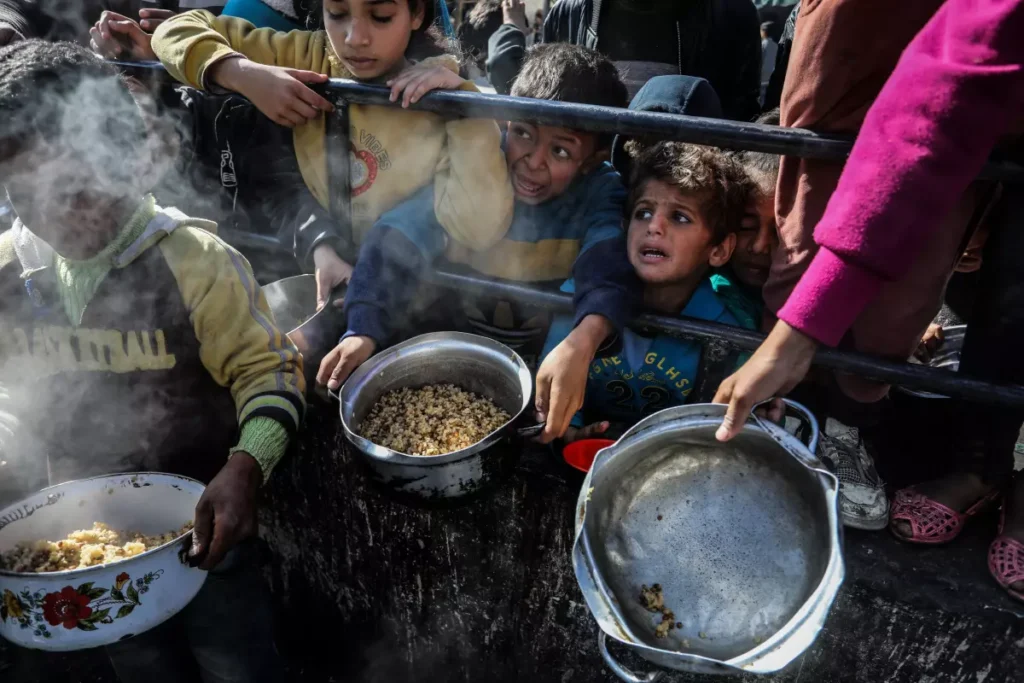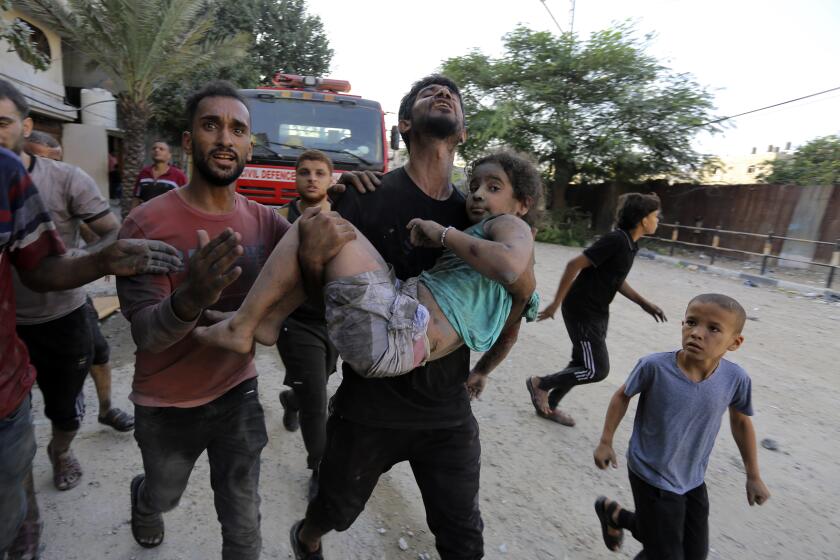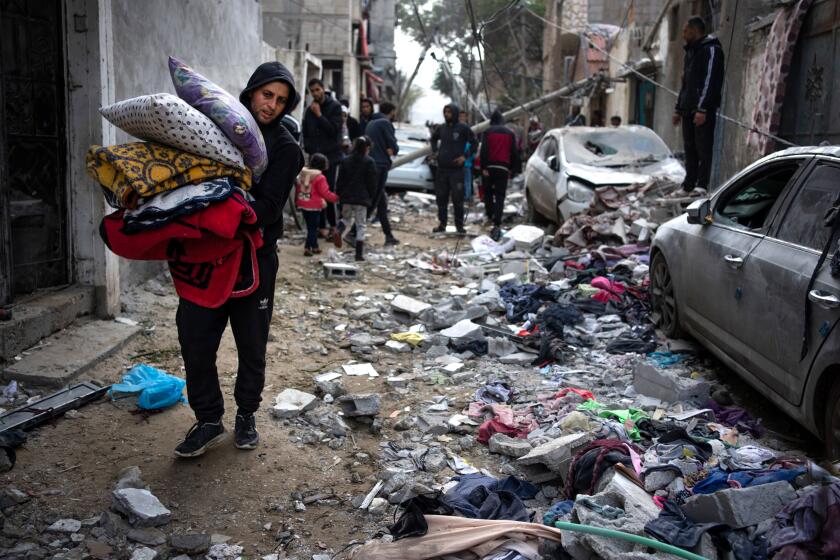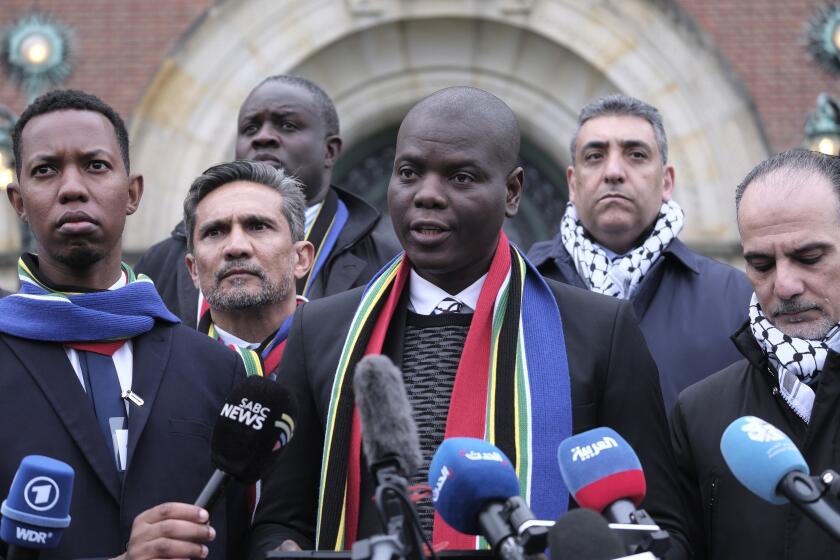I’m an American Doctor Who Went to Gaza: What I Saw Wasn’t War – It Was Annihilation
PALESTINE - ISRAEL, 26 Feb 2024
Dr. Irfan Galaria | Los Angeles Times - TRANSCEND Media Service

Displaced Palestinian children wait to receive food in Rafah, Gaza, on 9 Feb 2024 (Abed Rahim Khatib/Anadolu via Getty Images)
16 Feb 2024 – In late January, I left my home in Virginia, where I work as a plastic and reconstructive surgeon, and joined a group of physicians and nurses traveling to Egypt with the humanitarian aid group MedGlobal to volunteer in Gaza.
I have worked in other war zones. But what I witnessed during the next 10 days in Gaza was not war — it was annihilation. At least 28,000 Palestinians have been killed in Israel’s bombardment of Gaza. From Cairo, Egypt’s capital, we drove 12 hours east to the Rafah border. We passed miles of parked humanitarian aid trucks because they weren’t allowed into Gaza. Aside from my team and other envoy members from the United Nations and World Health Organization, there were very few others there.
Entering southern Gaza on Jan. 29, where many have fled from the north, felt like the first pages of a dystopian novel. Our ears were numb with the constant humming of what I was told were the surveillance drones that circled constantly. Our noses were consumed with the stench of 1 million displaced humans living in close proximity without adequate sanitation. Our eyes got lost in the sea of tents. We stayed at a guest house in Rafah. Our first night was cold, and many of us couldn’t sleep. We stood on the balcony listening to the bombs, and seeing the smoke rise from Khan Yunis.
As we approached the European Gaza Hospital the next day, there were rows of tents that lined and blocked the streets. Many Palestinians gravitated toward this and other hospitals hoping it would represent a sanctuary from the violence — they were wrong.
People also spilled into the hospital: living in hallways, stairwell corridors and even storage closets. The once-wide walkways designed by the European Union to accommodate the busy traffic of medical staff, stretchers and equipment were now reduced to a single-file passageway. On either side, blankets hung from the ceiling to cordon off small areas for entire families, offering a sliver of privacy. A hospital designed to accommodate about 300 patients was now struggling to care for more than 1,000 patients and hundreds more seeking refuge.
There were a limited number of local surgeons available. We were told that many had been killed or arrested, their whereabouts or even their existence unknown. Others were trapped in occupied areas in the north or nearby places where it was too risky to travel to the hospital. There was only one local plastic surgeon left and he covered the hospital 24/7. His home had been destroyed, so he lived in the hospital, and was able to stuff all of his personal possessions into two small hand bags. This narrative became all too common among the remaining staff at the hospital. This surgeon was lucky, because his wife and daughter were still alive, although almost everyone else working in the hospital was mourning the loss of their loved ones.
I began work immediately, performing 10 to 12 surgeries a day, working 14 to 16 hours at a time. The operating room would often shake from the incessant bombings, sometimes as frequent as every 30 seconds. We operated in unsterile settings that would’ve been unthinkable in the United States. We had limited access to critical medical equipment: We performed amputations of arms and legs daily, using a Gigli saw, a Civil War-era tool, essentially a segment of barbed wire. Many amputations could’ve been avoided if we’d had access to standard medical equipment. It was a struggle trying to care for all the injured within the constructs of a healthcare system that has utterly collapsed.
I listened to my patients as they whispered their stories to me, as I wheeled them into the operating room for surgery. The majority had been sleeping in their homes, when they were bombed. I couldn’t help thinking that the lucky ones died instantaneously, either by the force of the explosion or being buried in the rubble. The survivors faced hours of surgery and multiple trips to the operating room, all while mourning the loss of their children and spouses. Their bodies were filled with shrapnel that had to be surgically pulled out of their flesh, one piece at a time.
I stopped keeping track of how many new orphans I had operated on. After surgery they would be filed somewhere in the hospital, I’m unsure of who will take care of them or how they will survive. On one occasion, a handful of children, all about ages 5 to 8, were carried to the emergency room by their parents. All had single sniper shots to the head. These families were returning to their homes in Khan Yunis, about 2.5 miles away from the hospital, after Israeli tanks had withdrawn. But the snipers apparently stayed behind. None of these children survived.
On my last day, as I returned to the guest house where locals knew foreigners were staying, a young boy ran up and handed me a small gift. It was a rock from the beach, with an Arabic inscription written with a marker: “From Gaza, With Love, Despite the Pain.” As I stood on the balcony looking out at Rafah for the last time, we could hear the drones, bombings and bursts of machine-gun fire, but something was different this time: The sounds were louder, the explosions were closer.
This week, Israeli forces raided another large hospital in Gaza, and they’re planning a ground offensive in Rafah. I feel incredibly guilty that I was able to leave while millions are forced to endure the nightmare in Gaza. As an American, I think of our tax dollars paying for the weapons that likely injured my patients there. Already driven from their homes, these people have nowhere else to turn.
_________________________________________________
Irfan Galaria is a physician with a plastic and reconstructive surgery practice in Chantilly, Va. USA.
Join the BDS-BOYCOTT, DIVESTMENT, SANCTIONS campaign to protest the Israeli barbaric siege of Gaza, illegal occupation of the Palestine nation’s territory, the apartheid wall, its inhuman and degrading treatment of the Palestinian people, and the more than 7,000 Palestinian men, women, elderly and children arbitrarily locked up in Israeli prisons.
DON’T BUY PRODUCTS WHOSE BARCODE STARTS WITH 729, which indicates that it is produced in Israel. DO YOUR PART! MAKE A DIFFERENCE!
7 2 9: BOYCOTT FOR JUSTICE!
DISCLAIMER: The statements, views and opinions expressed in pieces republished here are solely those of the authors and do not necessarily represent those of TMS. In accordance with title 17 U.S.C. section 107, this material is distributed without profit to those who have expressed a prior interest in receiving the included information for research and educational purposes. TMS has no affiliation whatsoever with the originator of this article nor is TMS endorsed or sponsored by the originator. “GO TO ORIGINAL” links are provided as a convenience to our readers and allow for verification of authenticity. However, as originating pages are often updated by their originating host sites, the versions posted may not match the versions our readers view when clicking the “GO TO ORIGINAL” links. This site contains copyrighted material the use of which has not always been specifically authorized by the copyright owner. We are making such material available in our efforts to advance understanding of environmental, political, human rights, economic, democracy, scientific, and social justice issues, etc. We believe this constitutes a ‘fair use’ of any such copyrighted material as provided for in section 107 of the US Copyright Law. In accordance with Title 17 U.S.C. Section 107, the material on this site is distributed without profit to those who have expressed a prior interest in receiving the included information for research and educational purposes. For more information go to: http://www.law.cornell.edu/uscode/17/107.shtml. If you wish to use copyrighted material from this site for purposes of your own that go beyond ‘fair use’, you must obtain permission from the copyright owner.
Read more
Click here to go to the current weekly digest or pick another article:
PALESTINE - ISRAEL:



